It wasn’t a surprise that Restoration Council of Shan State (RCSS) boss General Yawd Serk readily flew to Naypyitaw for a second visit to negotiate peace settlement, or rather political give-and-take, as he time and again has openly said that he is for peaceful political dialogue to settle the differences and not the military solution.
.
During the period prior to the military junta’s last February coup, Karen National Union (KNU) headed by General Mutu Say Poe is the leading figure among the Nationwide Ceasefire Agreement – Signatory – Ethnic Armed Organizations (NCA-S-EAOs). But now the RCSS leader becomes the most treasured asset to the junta as the KNU has opted out of the NCA-based peace process, due to the KNU opposition of the coup and working in close relation with the junta’s rival National Unity Government (NUG) setup.
It seems the majority within the KNU is for the uprooting of junta regime, while Mutu Say Poe wanted to stick to NCA-based peace negotiation and wasn’t happy with the decision, although officially he is still the chairman of the KNU. Thus it is not a surprise that he readily accepted the Peace Process Steering Team (PPST) request to lead the organization in peace talks as a leading patron, emphasizing that he is acting in his personal capacity and not as the KNU chief.
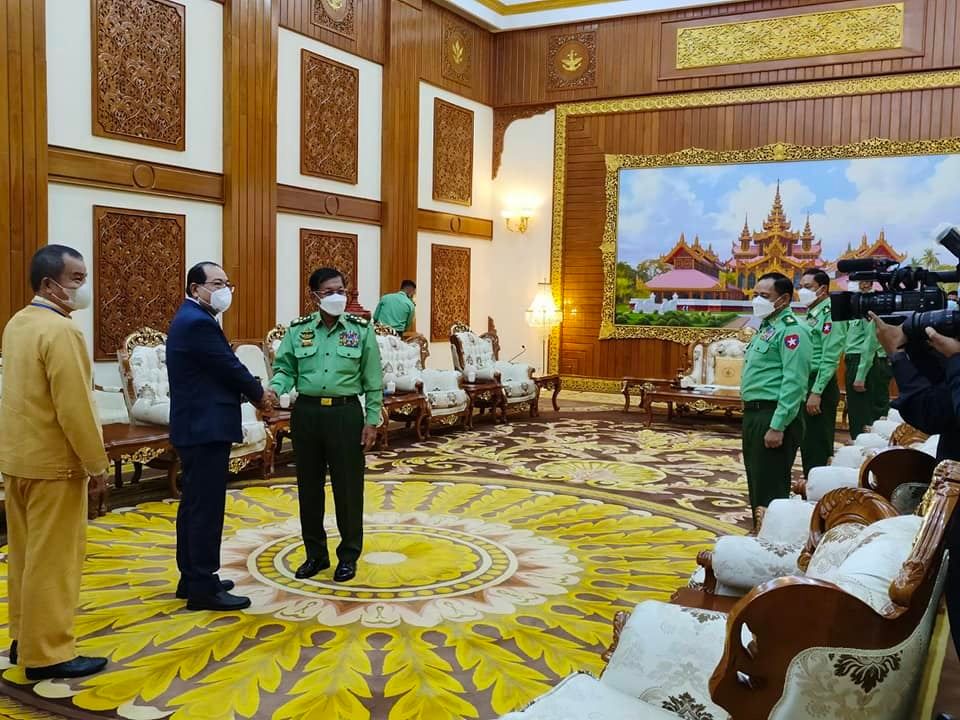
Leader of the PPST, Naing Aung Min, made a formal request last April to Mutu Say Poe to provide political guidance and leadership to the PPST, in which he personally replied the acceptance in a signed written letter on August 4.
The KNU chairman resigned as the leader of the PPST in 2019 and now he is returning the second time to serve as the leading patron of the group.
Ten ethnic armed force members of the PPST that have signed the Nationwide Ceasefire Agreement are KNU, RCSS/SSA, Pa-O National Liberation Organization (PNLO), Chin National Front (CNF), Arakan Liberation Party (ALP), Democratic Karen Benevolent Army (DKBA), All Burma Student’s Democratic Front (ABSDF), New Mon State Party (NMSP), Lahu Democratic Union (LDU) and Karen National Union/Karen National Liberation Army-Peace Council (KNU/KNLA-PC).
To date the KNU, CNF and ABSDF have opted out of the PPST, although there has been no official resignation tendered and no official expulsion has been announced by the organization.
And in the same vein, the RCSS also opted out of the organization due to its organizational existence problematic, probably because of its ongoing war and war-footing situation with the Shan State Progress Party (SSPP), Ta’ang National Liberation Army (TNLA) and United Wa State Army (UWSA), but maintained its commitment to work together with the PPST on a case to case basis.
Video footage and photos indicated that Yawd Serk has been given a VIP treatment in Tachileik, where he boarded the plane, and in Nyapyitaw upon his arrival. His meeting on August 29 with the Commander-in-Chief and State Administration Council (SAC) leader Min Aung Hlaing photos appearing on social media and news also showed that he is a very welcomed visitor.
According to the reports several meetings between the RCSS and SAC are in the pipeline and very likely, an agreement will be signed, just like the ALP, LDU and PNLO on August 26.
The gist understanding of the agreement according to the Eleven Media report of August 29 is as follows:
“During the discussion, strengthening of multiparty democratic system, building the Union based on democracy and federalism and further striving for ensuring peace and development of the Union were agreed. Moreover, the peace delegation is allowed to openly discuss its political anticipations and future talks in the second time talk and the ethnic armed organizations which don’t join the peace talks yet are also invited to the talks without advance restrictions in any situations.”
No doubt the planned meeting ahead which should be agreed between the RCSS and the junta will revolve around the junta’s explanation of “Union Agreement section (3) with National Constitution (2008), Table 1 of national constitution, union legislation and table 2 of State or Regional legislation sector-wise,” as reported by the Eleven Media.
The core message from junta leader Min Aung Hlaing is promising federalism, self-rule and self-determination on the condition that these EAOs do not demand secession from the so-called Union.
Rumors said the procrastination of RCSS boss delaying his appearance in Naypyitaw for a few days may be due to the speculations that he wasn’t amuse with the inaction of the Commander-in-Chief General Min Aung Hlaing not following up the promised signed agreement made during the first round of talks on May 20, followed by the SAC’s peace negotiation team led by Lieutenant General Yar Pyae on May 21 and 22.
Of course, nobody knows for sure what they have agreed upon as it was not made public, other than the ones that they wanted to publicize for public consumption.
Many speculate that it may be the redrawing of demarcation lines between the RCSS and its EAO opponents like the SSPP, TNLA and UWSA and developmental existence of the RCSS. And with the junta facing rebellion and opposition by all EAOs in Chin, Kachin, Karenni, Karen and now Arakan states, including the People’s Defense Force (PDF) and Local Defense Force (LDF), some under NUG and some not, in almost all divisions or regions mostly populated by the Bamar, it may be hard pressed to do much for the RCSS. If the junta in anyway move against the SSPP to do the RCSS a favor, it risks open conflict with the UWSA, as the Wa considers SSPP territory a buffer zone for its own security. Shan State is the only state left where the major EAOs have not fought against the junta.
But one thing is quite obvious, the junta is desperate to win over the ten EAOs that it held the first round peace talks with in April, which were the DKBA, KNU/KNLA-PC, PNLO, NMSP, ALP, RCSS and LDU. Non-signatories that joined the peace talks were the UWSA, the National Democratic Alliance Army (NDAA) and the SSPP.
Coming back to the aspiration or expectation of the junta that the remaining EAOs will come to the table eventually, an expert and well-versed peace negotiation process observer from the very beginning told this writer, “If Min Aung Hlaing’s objective is to draw groups like KNU, Karenni National Progressive Party (KNPP) , Kachin Independence Organization (KIO), CNF and Arakan Army (AA), I think he will need to implement the Chinese saying: Make those happy who are near (meaning the present ten negotiation partner groups) and those who are far (others unresponsive EAOs) will come. That is if he decides to continue doing his own way.”
“But if he is willing and ready to do it as a joint venture, his success will be greater. However so far I haven’t seen any sign of that as he’s still playing close to his chest,” he added.
For now, the country’s situation is highly convoluted, compounded by the fact that the junta thinks that it is winning and the ethnic-democratic loose alliance is also considering the same, with no end scenario in sight any time soon.





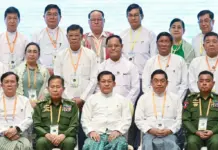
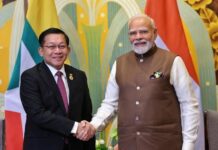
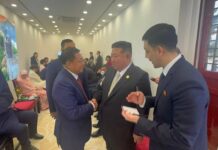
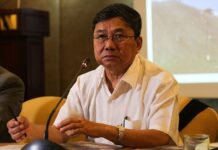
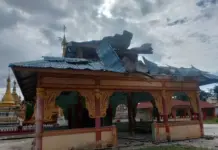






Leave a Comments